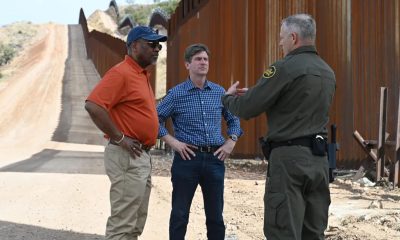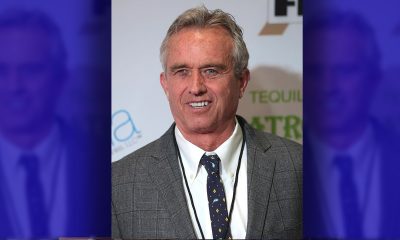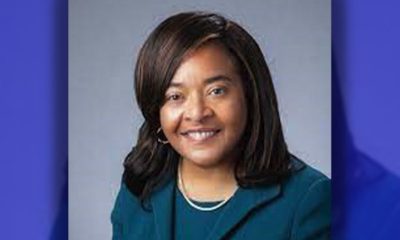Politics
Lawmakers Seek to Wrap up Costly Tribal Relocation Program

This Saturday, Jan. 24, 2015 photo provided by Ron Lee, Office of Rep. Ann Kirkpatrick shows Democratic U.S. Rep. Ann Kirkpatrick of Arizona, right, speaks with tribal members on the Hopi reservation in northeastern Arizona. (AP Photo/Office of Rep. Ann Kirkpatrick, Ron Lee)
Felicia Fonseca, ASSOCIATED PRESS
FLAGSTAFF, Ariz. (AP) — The rolling hills of northeastern Arizona where cornfields lined a watering hole and sheep grazed in the distance were home to Susie Robinson and her extended family. When she moved farther east into a new four-bedroom home, it wasn’t by choice but the result of a bitter land dispute between the Navajo and Hopi tribes that dates back centuries.
The federal government’s attempt to have these tribes share land failed miserably, leading to one of the largest single relocation efforts in U.S. history. Thousands of Navajos have been transplanted into new homes off Hopi land, while dozens of Hopis have been moved off Navajo land.
Federal officials are trying to figure out how best to wrap up the work of the relocation program that has exceeded its original $41 million price tag by more than $500 million and dragged on decades longer than planned. The effort threatens to get even costlier with many people still awaiting new housing.
“I want to move this forward,” said Republican U.S. Rep. Ken Calvert of California, who recently visited the reservations with other congressional delegates to hear from tribal leaders on the matter. “The relocation program was never intended to be carried on in perpetuity.”
The Office of Navajo-Hopi Indian Relocation was established by Congress in the years after the neighboring tribes were assigned reservations. It underlines a history of animosity between the Navajo and Hopi that has included threats of violence over property and clashes over cultural, business and political views.
Land is the most contentious issue.
The Navajo and Hopi tribes have occupied the same territory for centuries, though Navajos tended to be more nomadic sheepherders and Hopis mostly resided on three mesas towering above the surrounding desert.
In 1882, President Chester Arthur designated 2.4 million acres in Arizona for the Hopi Tribe and other Indians. Hopis outnumbered Navajos six to one on the land, but the Navajo population grew over time.
The federal government later gave the tribes the OK to sue over the land, and the Hopis responded in 1958 by seeking sole control of it. Four years later, a federal court deemed 1.8 million acres a joint-use area.
But the tribes were not amenable to sharing the land and, ultimately, Congress divided it and ordered tribal members to leave each other’s reservations. The Navajo Nation — the country’s largest reservation at 27,000 square miles — now completely surrounds the 2,500-square-mile Hopi reservation.
When the federal government proposed relocation, some Navajos armed themselves and threatened bloodshed if anyone tried to move them.
About a handful of Navajos who refused to leave Hopi land still live there under Hopi jurisdiction. Tensions run high at times, particularly over livestock grazing. The Hopi Tribe seized sheep from Navajos last year to preserve the vegetation.
The two tribes also have clashed in other areas. Until recently, they refused to be in the same congressional district. The Hopi Tribe also has been fighting a proposal for the Navajo Nation to build an aerial tram into the Grand Canyon.
“The relocation basically was a very traumatic experience for Navajo families who were directly affected,” Navajo lawmaker Walter Phelps said. “But it was also a very traumatic experience politically that has a certain amount of impact on the relationship between the tribes and the federal government.”
Still, the relocation program mushroomed, with the number of people eligible for housing benefits almost four times higher than expected.
In all, more than 7,200 heads of household have sought relocation benefits, representing 16,386 people. The relocation office has approved more than half of those applications.
The program was slated to end in 1986, but Navajo opposition to relocation early on and a shortage of suitable land to build houses helped prolong it.
Today, about 120 Navajos still await homes, 300 administrative appeals are pending, and eligibility is being determined on 65 applications, according to a recent report from the Interior Department’s Office of Inspector General. The program’s cost could go up another $35 million to $82 million once those applications and appeals are settled.
Robinson moved into her new, stucco house on a 1-acre plot in 1985. It was much larger than the two-room house she shared with her mother growing up. But the windows, foundation and stucco started cracking within a year, and she doesn’t have the sheep, cornfields, watering holes or ceremonial hogan she had as a child.
For Robinson, the relocation house isn’t home.
“I still miss my old place,” said the 60-year-old teacher who works with special education students at a school on the Hopi reservation. “If I were to get that piece of land back, I would be there in a heartbeat.”
About a dozen Hopi families relocated to a community called Spider Mound on the Hopi reservation. They have decried the lack of paved roads, running water, electricity and fire suppression that the Hopi chairman’s office said they were promised.
The delegation from the U.S. House Appropriations subcommittee that Calvert chairs said it saw an obvious need to address areas of disrepair but wasn’t sure that would be covered by the relocation program.
The relocation effort could be completed faster with legislative changes that could include a cash payout instead of a new home, or an increase in annual appropriations, the Office of Inspector General report said.
Democratic Rep. Ann Kirkpatrick, whose district includes the Navajo and Hopi reservations, said she would work with the subcommittee to ensure the federal government meets its obligation to the tribes.
“They heard from a lot of concerned people who are relocates who spoke very eloquently about their conditions of living and how desperate the situation is,” she said.
Copyright 2015 The Associated Press. All rights reserved. This material may not be published, broadcast, rewritten or redistributed.
###
Bay Area
MAYOR BREED ANNOUNCES $53 MILLION FEDERAL GRANT FOR SAN FRANCISCO’S HOMELESS PROGRAMS
San Francisco, CA – Mayor London N. Breed today announced that the U.S. Department of Housing and Urban Development (HUD) has awarded the city a $53.7 million grant to support efforts to renew and expand critical services and housing for people experiencing homelessness in San Francisco.

FOR IMMEDIATE RELEASE:
Wednesday, January 31, 2024
Contact: Mayor’s Office of Communications, mayorspressoffice@sfgov.org
***PRESS RELEASE***
MAYOR BREED ANNOUNCES $53 MILLION FEDERAL GRANT FOR SAN FRANCISCO’S HOMELESS PROGRAMS
HUD’s Continuum of Care grant will support the City’s range of critical services and programs, including permanent supportive housing, rapid re-housing, and improved access to housing for survivors of domestic violence
San Francisco, CA – Mayor London N. Breed today announced that the U.S. Department of Housing and Urban Development (HUD) has awarded the city a $53.7 million grant to support efforts to renew and expand critical services and housing for people experiencing homelessness in San Francisco.
HUD’s Continuum of Care (CoC) program is designed to support local programs with the goal of ending homelessness for individuals, families, and Transitional Age Youth.
This funding supports the city’s ongoing efforts that have helped more than 15,000 people exit homelessness since 2018 through City programs including direct housing placements and relocation assistance. During that time San Francisco has also increased housing slots by 50%. San Francisco has the most permanent supportive housing of any county in the Bay Area, and the second most slots per capita than any city in the country.
“In San Francisco, we have worked aggressively to increase housing, shelter, and services for people experiencing homelessness, and we are building on these efforts every day,” said Mayor London Breed. “Every day our encampment outreach workers are going out to bring people indoors and our City workers are connecting people to housing and shelter. This support from the federal government is critical and will allow us to serve people in need and address encampments in our neighborhoods.”
The funding towards supporting the renewal projects in San Francisco include financial support for a mix of permanent supportive housing, rapid re-housing, and transitional housing projects. In addition, the CoC award will support Coordinated Entry projects to centralize the City’s various efforts to address homelessness. This includes $2.1 million in funding for the Coordinated Entry system to improve access to housing for youth and survivors of domestic violence.
“This is a good day for San Francisco,” said Shireen McSpadden, executive director of the Department of Homelessness and Supportive Housing. “HUD’s Continuum of Care funding provides vital resources to a diversity of programs and projects that have helped people to stabilize in our community. This funding is a testament to our work and the work of our nonprofit partners.”
The 2024 Continuum of Care Renewal Awards Include:
- $42.2 million for 29 renewal PSH projects that serve chronically homeless, veterans, and youth
- $318,000 for one new PSH project, which will provide 98 affordable homes for low-income seniors in the Richmond District
- $445,00 for one Transitional Housing (TH) project serving youth
- $6.4 million dedicated to four Rapid Rehousing (RRH) projects that serve families, youth, and survivors of domestic violence
- $750,00 for two Homeless Management Information System (HMIS) projects
- $2.1 million for three Coordinated Entry projects that serve families, youth, chronically homeless, and survivors of domestic violence
In addition, the 2023 CoC Planning Grant, now increased to $1,500,000 from $1,250,000, was also approved. Planning grants are submitted non-competitively and may be used to carry out the duties of operating a CoC, such as system evaluation and planning, monitoring, project and system performance improvement, providing trainings, partner collaborations, and conducting the PIT Count.
“We are very appreciative of HUD’s support in fulfilling our funding request for these critically important projects for San Francisco that help so many people trying to exit homelessness,” said Del Seymour, co-chair of the Local Homeless Coordinating Board. “This funding will make a real difference to people seeking services and support in their journey out of homelessness.”
In comparison to last year’s competition, this represents a $770,000 increase in funding, due to a new PSH project that was funded, an increase in some unit type Fair Market Rents (FMRs) and the larger CoC Planning Grant. In a year where more projects had to compete nationally against other communities, this represents a significant increase.
Nationally, HUD awarded nearly $3.16 billion for over 7,000 local homeless housing and service programs including new projects and renewals across the United States.
Activism
Oakland Post: Week of April 17 – 23, 2024
The printed Weekly Edition of the Oakland Post: Week of April 17 – 23, 2024

To enlarge your view of this issue, use the slider, magnifying glass icon or full page icon in the lower right corner of the browser window. ![]()
Barbara Lee
Congresswoman Barbara Lee Issues Statement on Deaths of Humanitarian Aid Volunteers in Gaza
On April 2, a day after an Israeli airstrike erroneously killed seven employees of World Central Kitchen (WCK), a humanitarian organization delivering aid in the Gaza Strip, a statement was release by Rep. Barbara Lee (D-CA-12). “This is a devastating and avoidable tragedy. My prayers go to the families and loved ones of the selfless members of the World Central Kitchen team whose lives were lost,” said Lee.

By California Black Media
On April 2, a day after an Israeli airstrike erroneously killed seven employees of World Central Kitchen (WCK), a humanitarian organization delivering aid in the Gaza Strip, a statement was release by Rep. Barbara Lee (D-CA-12).
“This is a devastating and avoidable tragedy. My prayers go to the families and loved ones of the selfless members of the World Central Kitchen team whose lives were lost,” said Lee.
The same day, it was confirmed by the organization that the humanitarian aid volunteers were killed in a strike carried out by Israel Defense Forces (IDF). Prior to the incident, members of the team had been travelling in two armored vehicles marked with the WCF logo and they had been coordinating their movements with the IDF. The group had successfully delivered 10 tons of humanitarian food in a deconflicted zone when its convoy was struck.
“This is not only an attack against WCK. This is an attack on humanitarian organizations showing up in the direst situations where food is being used as a weapon of war. This is unforgivable,” said Erin Gore, chief executive officer of World Central Kitchen.
The seven victims included a U.S. citizen as well as others from Australia, Poland, the United Kingdom, Canada, and Palestine.
Lee has been a vocal advocate for a ceasefire in Gaza and has supported actions by President Joe Biden to airdrop humanitarian aid in the area.
“Far too many civilians have lost their lives as a result of Benjamin Netanyahu’s reprehensible military offensive. The U.S. must join with our allies and demand an immediate, permanent ceasefire – it’s long overdue,” Lee said.
-

 Activism4 weeks ago
Activism4 weeks agoOakland Post: Week of March 27 – April 2, 2024
-

 #NNPA BlackPress4 weeks ago
#NNPA BlackPress4 weeks agoCOMMENTARY: D.C. Crime Bill Fails to Address Root Causes of Violence and Incarceration
-

 #NNPA BlackPress4 weeks ago
#NNPA BlackPress4 weeks agoFrom Raids to Revelations: The Dark Turn in Sean ‘Diddy’ Combs’ Saga
-

 #NNPA BlackPress4 weeks ago
#NNPA BlackPress4 weeks agoCOMMENTARY: Lady Day and The Lights!
-

 #NNPA BlackPress4 weeks ago
#NNPA BlackPress4 weeks agoMayor, City Council President React to May 31 Closing of Birmingham-Southern College
-

 #NNPA BlackPress4 weeks ago
#NNPA BlackPress4 weeks agoBaltimore Key Bridge Catastrophe: A City’s Heartbreak and a Nation’s Alarm
-

 #NNPA BlackPress4 weeks ago
#NNPA BlackPress4 weeks agoBaltimore’s Key Bridge Struck by Ship, Collapses into Water
-

 #NNPA BlackPress4 weeks ago
#NNPA BlackPress4 weeks agoBeloved Actor and Activist Louis Cameron Gossett Jr. Dies at 87





















































